
Gravel is an inexpensive paving material overall, but costs vary by type. Find out what average gravel prices will look like for your project.
Take your garden bed to the next level with the perfect ground cover


Mulch is an organic material that promotes soil health, while rocks prevent weed growth.
Rocks are low-maintenance and long-lasting, while mulch must be replaced every few years.
Rock landscaping costs $45 to $140 per cubic yard, and adding mulch to your yard costs $85 per cubic yard.
The best option for your yard depends on your budget, aesthetic preference, customizations, and maintenance needs.
Deciding between mulch versus rock for DIY landscaping can be tricky. On one hand, mulch landscaping provides nutrients to your soil, and on the other, rocks are long-term, aesthetically pleasing landscape solutions. Choosing the best landscape material for your garden requires the right knowledge, so let’s explore the pros and cons of mulch and rocks to take your yard to the next level.
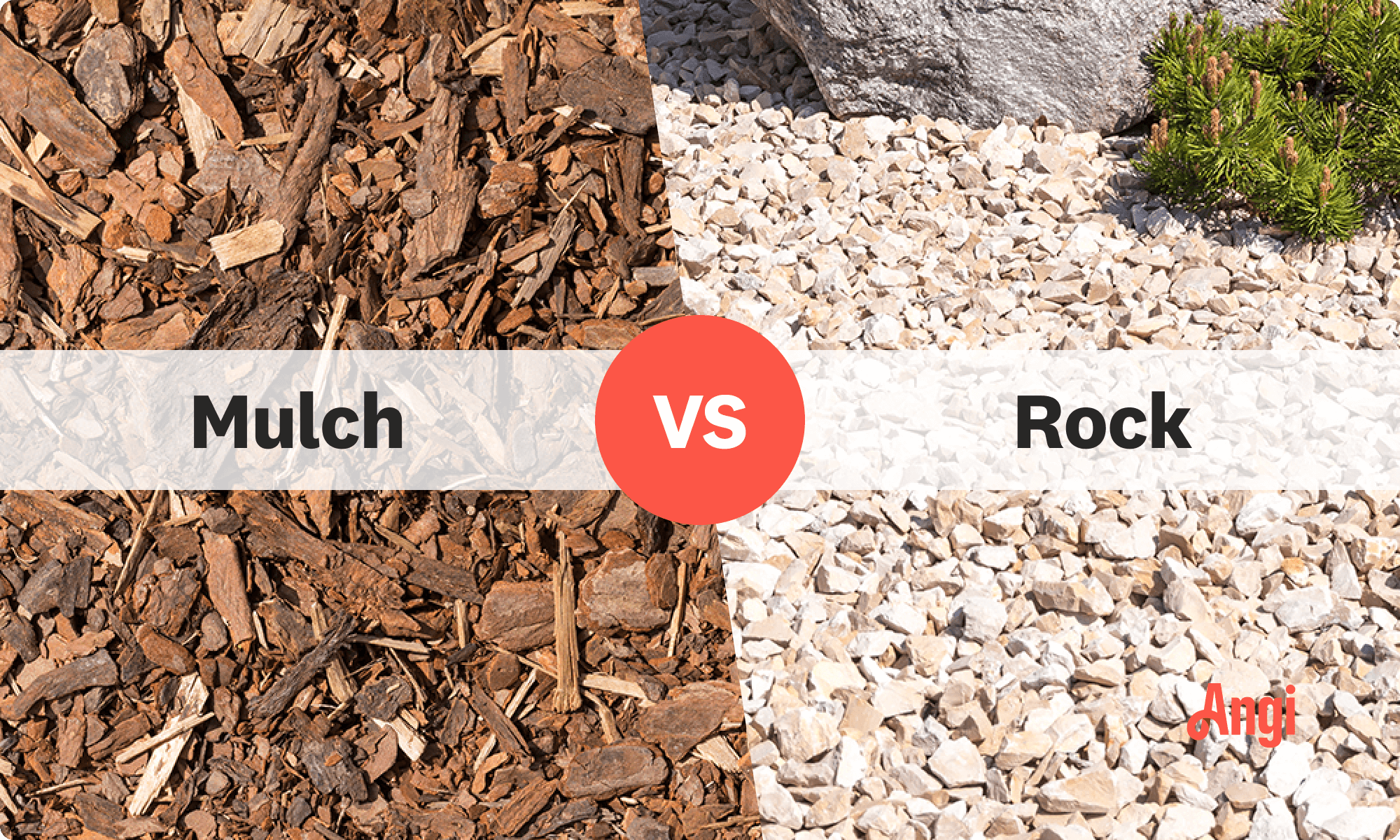
When it comes to landscaping for garden beds, there are two main options for ground cover: mulch and rock.
Mulch is an organic material that retains moisture and enriches soil as it breaks down over time. It's beneficial for soil health but must be replaced every few years. Rock is a low-maintenance option that provides long-term resilience and a trendy look. It prevents weed growth and doesn't require replacement, but it also doesn't contribute to soil health like mulch.

Mulch is a protective layer spread over the soil, derived from various organic materials such as wood shavings, bark, compost, and leaves. It adds nutrients to soil as it decomposes, retains soil moisture, and gives gardens a neat, finished look.
| Pros | Cons |
|---|---|
| Suppresses weeds | Frequent replacement |
| Boosts soil moisture | Can attract pests |
| Adds nutrients | Can be flammable |
Best for:
Homeowners in drier regions trying to conserve water
Those focused on eco-friendly gardening methods
Homeowners who want to spend less time weeding garden beds
One of the most significant advantages of mulch over rock for garden beds is that it adds nutrients to the soil as it decomposes. That means richer soil that boosts plant health and makes them more vibrant and more disease-resistant. Mulch isn't just a cover—it creates an enriching environment below the surface. Another benefit of mulch is that it keeps the soil cool and maintains moisture, which can also help plants thrive.
Like rock, mulch is a physical barrier, making it harder for weed seeds to reach the soil and germinate. Using mulch can mean less time on your knees pulling out weeds and more time enjoying your beautiful, weed-free garden.
Mulch is lightweight and easier to transport than rock, making it an easier and more comfortable option for DIYers. You can also rely on a mulch delivery service near you to make your job even easier and less time-consuming. It’s also more affordable than rock, and if you want to save even more money, you can even make your own mulch out of organic matter from your yard.
Organic mulch decomposes, which means you’ll need to replace it at least every one to two years. If you're a homeowner with a busy schedule, this periodic maintenance might be a significant drawback. In particularly moist or rainy areas, mulch is also more likely to rot and promote mold growth, which means you may also have to remove old mulch before laying down a new bed—not something you have to worry about with rock.
Insects and pests are attracted to various types of mulch, especially as they decompose. In some cases, those pests can move from your mulch to nearby structures, like sheds or even your home, which can lead to property damage if you don’t take a proactive approach to pest control. You can opt for specific mulch types that naturally repel bugs—like cedar or cypress—to reduce the risk of pest issues, but these varieties are more expensive than standard mulch.
Some types of mulch, especially those made with fine or shredded wood materials, could pose a fire risk in specific situations. Maintain a safe distance between flammable mulches and your home, ensure adequate spacing between plants, and consider using rocks or gravel around your home's outer edge as a fire break. You might want to forgo mulch altogether as an option if you live in an area prone to wildfires.
Too much mulch can hinder plant growth as it blocks the nutrients, sunlight, and water it needs to grow. One to four inches of mulch is your average mulch depth for most plants.
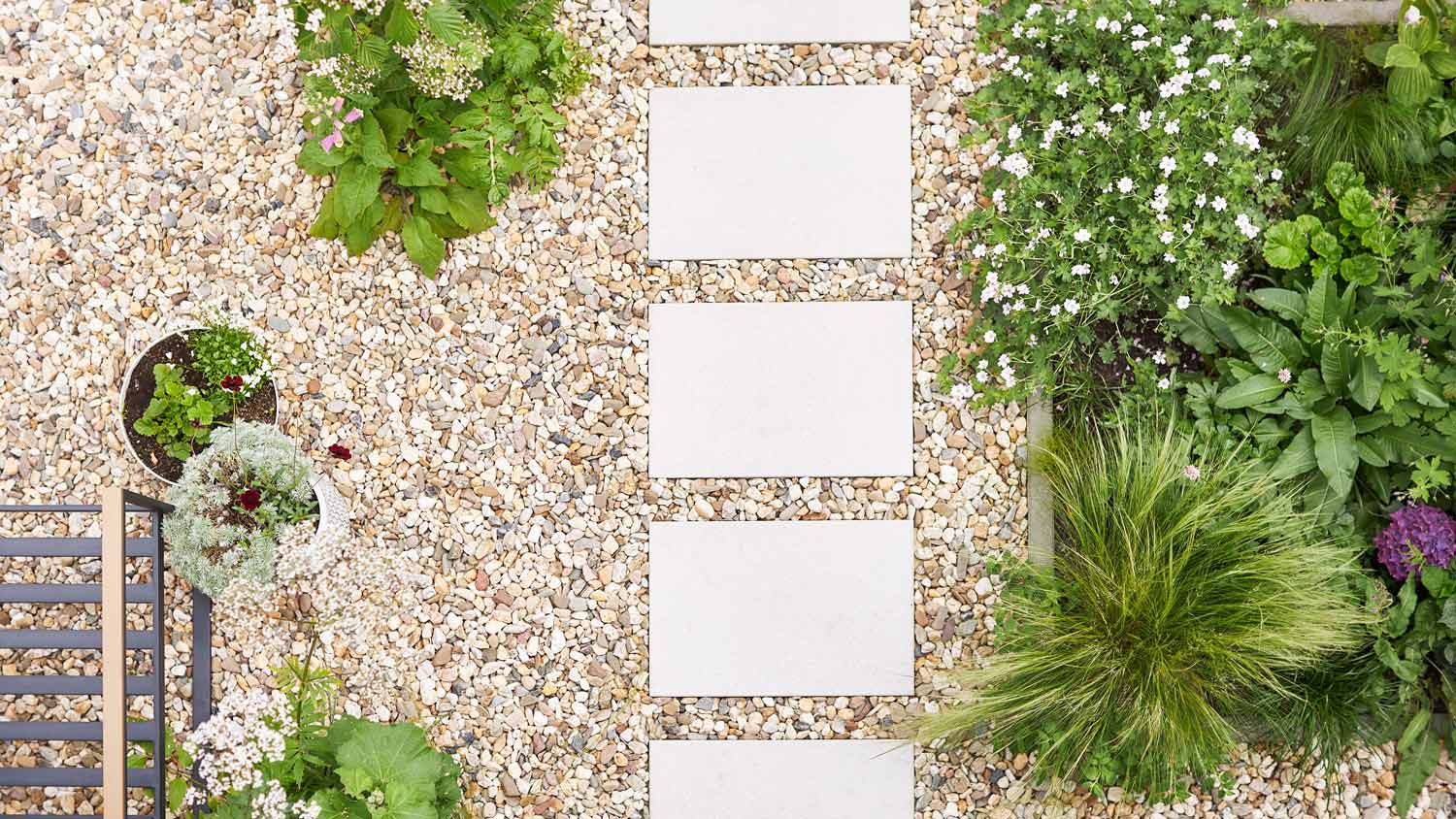
Rock landscaping, also referred to as hardscaping, incorporates various types, sizes, and colors of rocks, stones, and gravel to enhance the aesthetic and functionality of outdoor spaces.
| Pros | Cons |
|---|---|
| Low maintenance | Much heavier |
| Combats weeds | Hard to replace |
| High durability | Doesn't enrich soil |
Best for:
Homeowners who prefer a "set it and forget it" low-maintenance approach
Homeowners looking for quick-draining, durable material
Anyone looking for a stylish gardening investment
Rock landscaping doesn’t decompose or rot like mulch, so it allows you to enjoy a low-maintenance garden that still looks incredible. If you don’t want to update the look of your landscaping, rocks can last indefinitely and still look great with proper maintenance.
Since rock is heavier than mulch, it’s often a better option in areas that see intense winds and heavy rains. These weather conditions can displace mulch and make a mess of your property, but rock is much more likely to stay put, especially if you use larger stones like river rock.
In an era when water conservation is more critical than ever, rock landscaping shines as a responsible and eco-friendly choice. With a rock garden, water consumption plummets compared to a traditional lawn. This means you'll not only be saving the environment, but you'll also see the benefits in your water bill.
While sunbathing rocks might look visually stunning, they also absorb heat. This could spell trouble for your nearby plants, especially during intense summers. If these conditions ring familiar, consider heat-tolerant plants or provide adequate shade to mitigate this risk of plant damage.
Organic materials like mulch decompose over time, releasing nutrients that enrich your soil. Unfortunately, rock landscaping doesn't offer the same benefits. If your garden is hungry for nutrients, ensure you’re fertilizing your plants regularly or exploring options like combining rocks with nutrient-enhancing mulch.
Hardscaping costs more than softscaping, so rocks are more expensive across the board. Even when factoring in smaller garden beds and lower-quality materials, gravel prices are higher than mulch prices. Additionally, rock is heavier than mulch and more challenging to work with, especially if you don’t have the right tools. You’re more likely to have to rely on a local hardscaper to deliver and install rock, which contributes to higher installation prices.
We've worked with a lawn care company for over a year for seasonal clean-ups and weekly mowing services. They're courteous, reliable, and efficient, We recently hired them to landscape under a new swing set. The ground was uneven, so they creatively leveled it while maintaining drainage requirements and installed a soft-play surface with plenty of mulch. Our kids are thrilled, and we're relieved they have a safe play area.
JV Lawn and Garden, LLC
Darien, Connecticut
There are a few key things to keep in mind when deciding between mulch and rock for your landscaping.
Rock landscaping offers versatility from small pebbles to large boulders, and different options can create a captivating range of textures and topographies. Each type of landscaping rock has its unique hue, allowing you to color your garden canvas as you wish. You can invest in different sizes, cuts, and polishes for an elevated modern look or choose a more eclectic assortment of rocks for a rustic, organic finish. The variety of materials likely won’t be the thing that limits your landscaping rock ideas.
Mulch offers some customization options, but they’re far fewer in number than you’d get with rocks. Organic mulches like wood chips, bark, straw, and compost come in different colors and textures, but they always add a warm, natural appeal to your garden. Ultimately, mulch is more one-dimensional than rock is.
Landscaping materials will see various weather conditions, and their resistance to these extremes defines their durability. In this regard, rocks stand out—they can weather heavy foot traffic and harsh climatic elements without being compacted, and they’re less likely to get washed or blown away.
Additionally, rocks do not decompose, and mulch does. You’ll have to replace mulch every one to two years and watch out for rot and mold growth in the meantime, but landscaping rocks can last a lifetime and still look good as new with proper maintenance.
Generally speaking, rocks tend to be more expensive upfront. Landscaping rocks cost from $45 to $140 per cubic yard, depending on the type of rock you choose. For instance, budget-friendly options like crushed granite can be as little as $30 per ton, while polished river rocks cost up to $700 per ton.
On the flip side, mulch is the budget-friendly contender in this race. You can buy bags of mulch for somewhere around $85 per cubic yard, and getting mulch delivered will cost you even less. Premium options like redwood or black walnut mulch can drive up your costs, but compared to premium rock options, you’ll still save a lot of money up front.
One thing to consider is that the ongoing cost of replacing mulch will add up over time, whereas you virtually never have to replace landscaping rocks.
Mulch consists of organic matter that breaks down over time, infusing the soil below with nutrients. It also does a good job of helping the soil retain moisture, which is beneficial for most plants, especially in areas with more extreme summers. Planting flowers in mulch helps keep them happy and healthy for the season. Rocks will help the soil retain moisture, but because they don’t break down, they won’t add any organic matter.
Rock is very heavy, making it more difficult to transport and install than mulch. You can buy small amounts of landscaping rocks in bags, but they still weigh about 50 pounds each. If you need greater quantities for covering large garden beds or walkways, it’s often best to have a hardscaper deliver and install them for you. Landscaping boulders, especially, require special equipment and additional labor to move them into place.
Mulch is available at most home improvement stores and comes in 50-pound bags, too, but you get more coverage for the weight. The need for less material to get proper coverage means you can load the bags in your car or truck and take them home yourself. To install, all you have to do is lug the bags to the garden, dump them, and spread the mulch out. If you want to save time and labor, you can still hire a mulching company near you to get the job done, but mulch is generally easier to DIY.
Mulch and landscaping rocks look drastically different and provide varying looks for your property, but both will boost curb appeal. Just keep in mind that you’ll need to refresh and replace mulch more often to maintain the same manicured look. Ultimately, it comes down to personal preference, so you can choose the option you like better while considering its pros and cons.
When it comes to the mulch versus rock argument, there are a few key things you can think about to figure out which is best for your landscaping.
If you can deal with higher up-front costs in favor of saving money on replacement and maintenance in the long run, choose rocks over mulch.
If you want to provide nutrients for your soil to boost plant growth, mulch is the better option, as it naturally decomposes and enriches the soil.
If you live in a hot, sunny area, mulch may do a better job of keeping crucial moisture in your soil, and it won’t reflect sunlight and heat that can damage young or delicate plants.
If you’re DIYing your landscape, consider mulch over rocks. Mulch is lightweight, making it easier to transport and spread throughout your garden beds.
Opt for rocks if you live in a moist or particularly rainy area. Mulch can mold and rot if it doesn’t dry out regularly.
Choose rocks over mulch if you’re concerned about wood-destroying insects getting into your home, especially if your garden beds are right against your home’s foundation.
From average costs to expert advice, get all the answers you need to get your job done.

Gravel is an inexpensive paving material overall, but costs vary by type. Find out what average gravel prices will look like for your project.
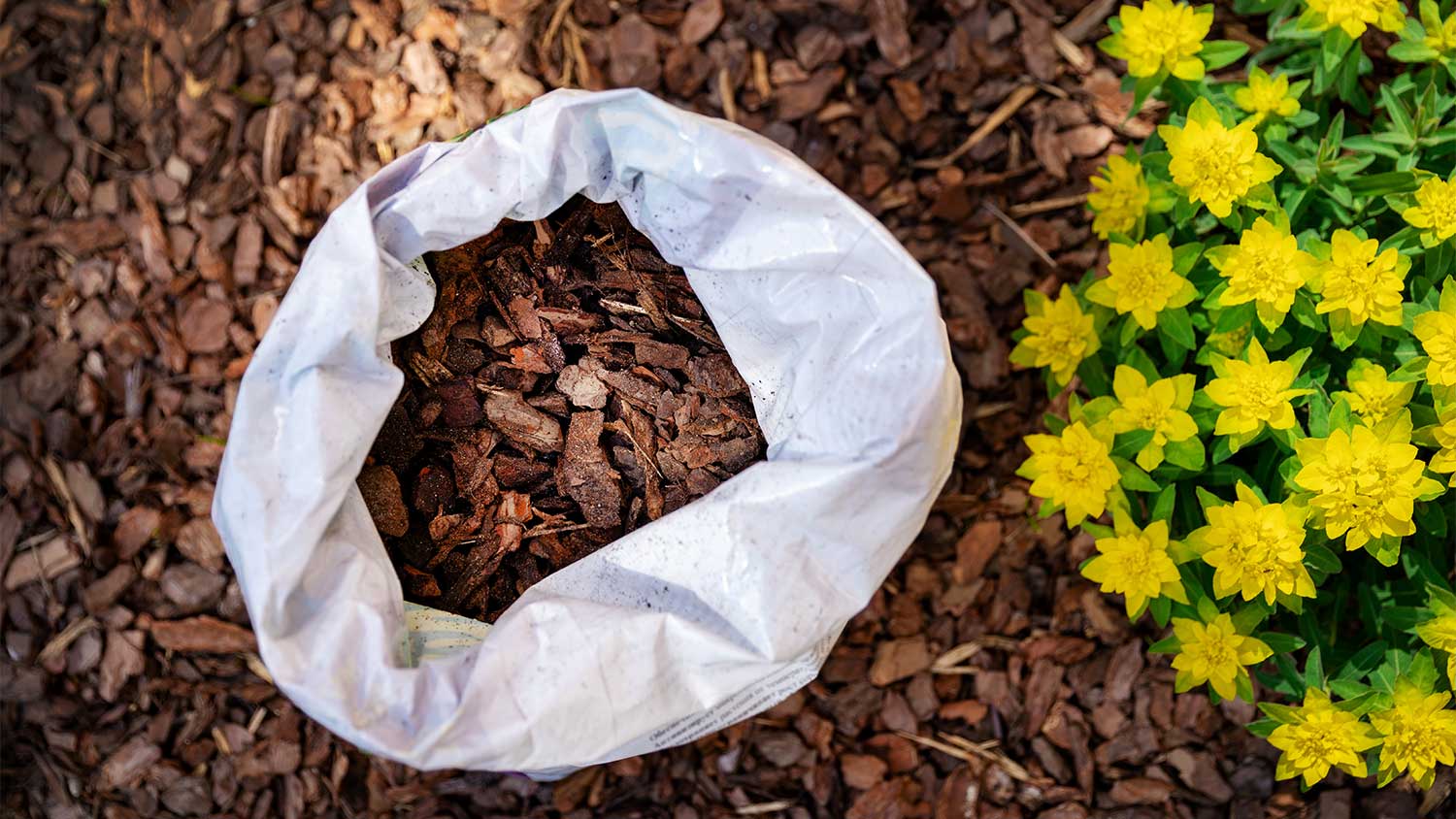
Find out the average mulch delivery and installation cost, plus key factors that impact your price. Learn how to budget, compare options, and save on your landscaping project.
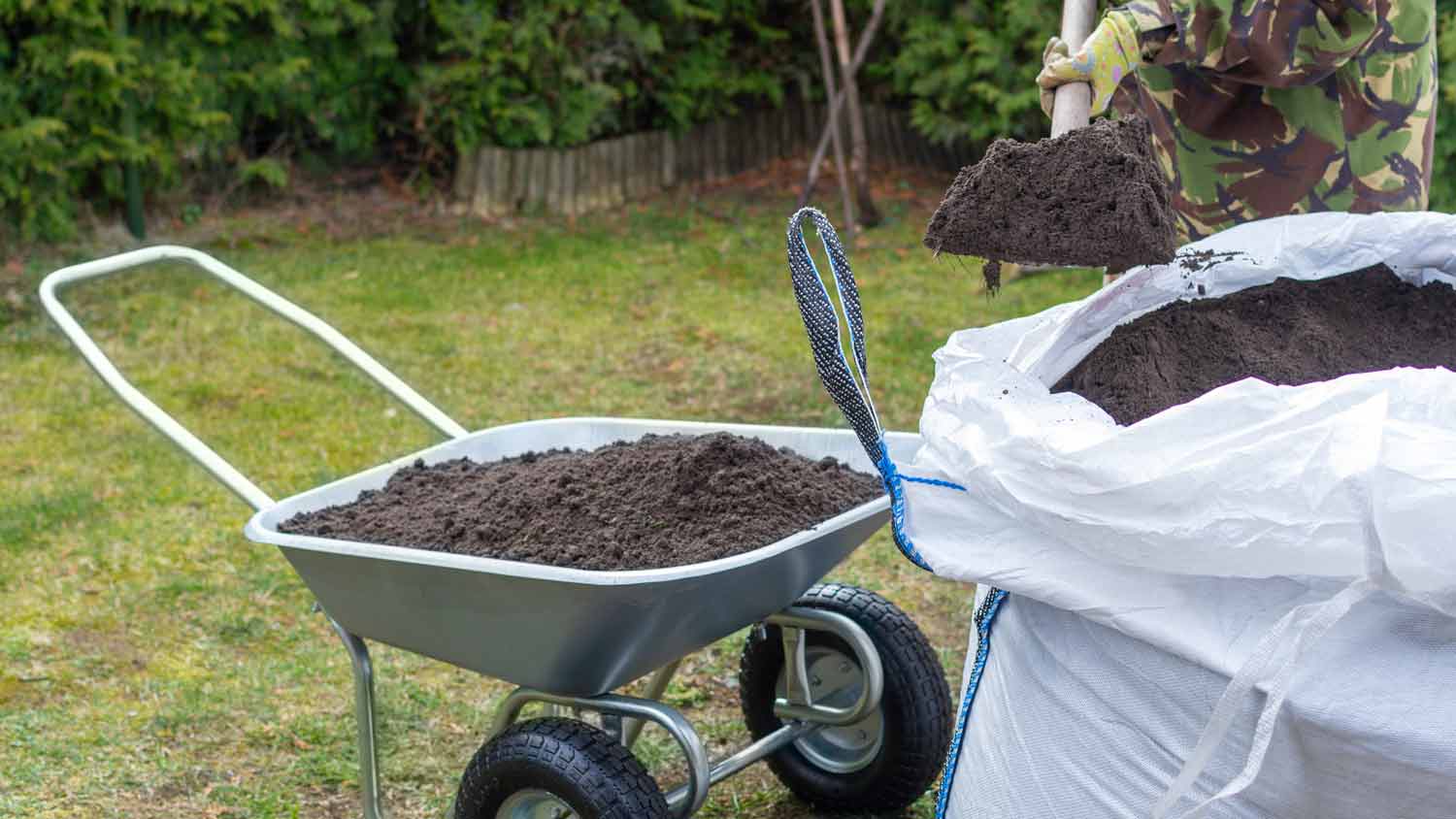
Get clear, up-to-date fill dirt cost info. Learn average prices, cost factors, and tips to save on your next fill dirt project.

Looking to add curb appeal to your home and protect your garden beds by laying down mulch? Find out how many bags of mulch you need to get the job done.
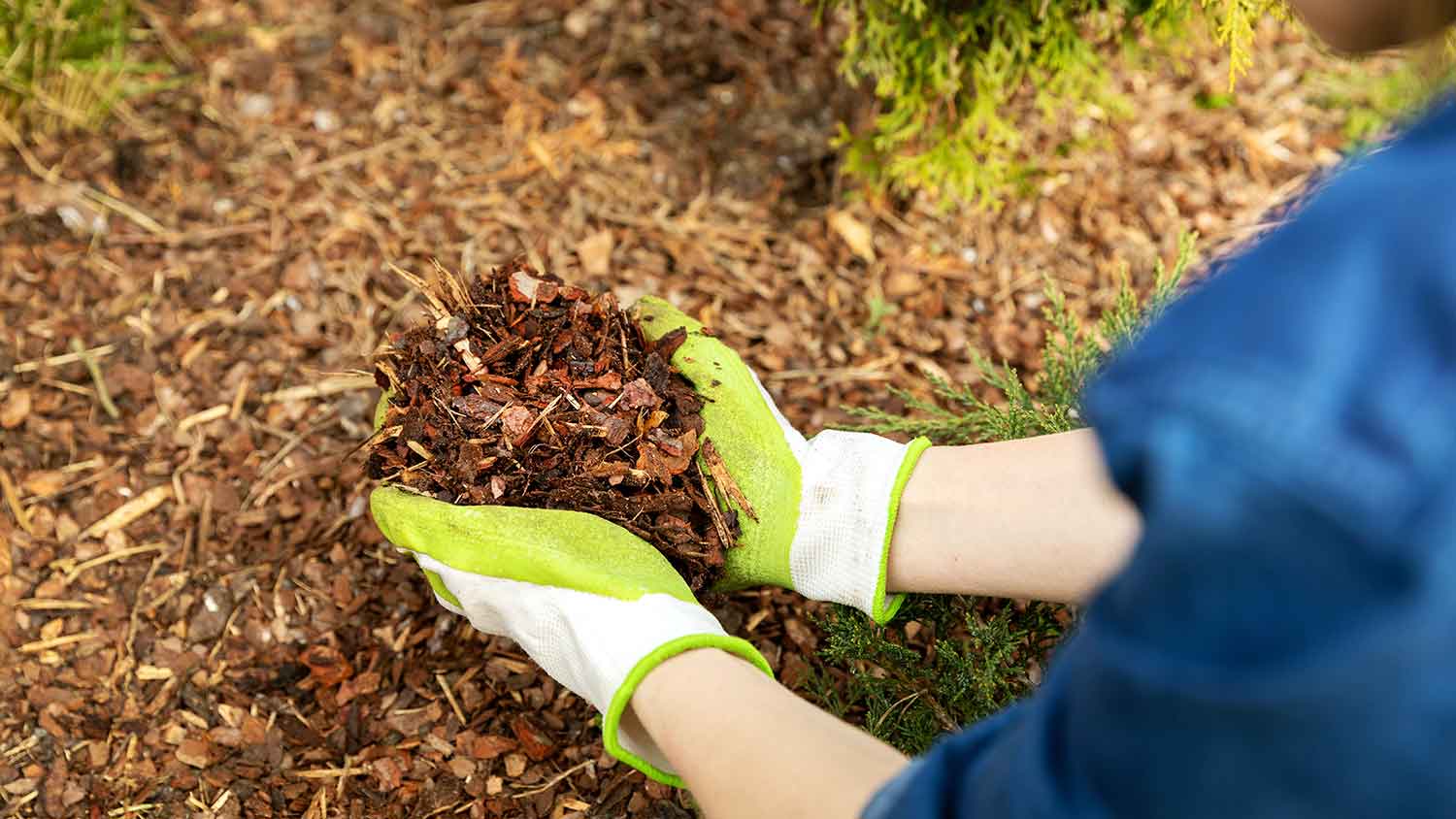
Discover mulch removal cost estimates. Discover what influences pricing, compare DIY vs. professional services, and find expert tips to save on your mulch removal project.
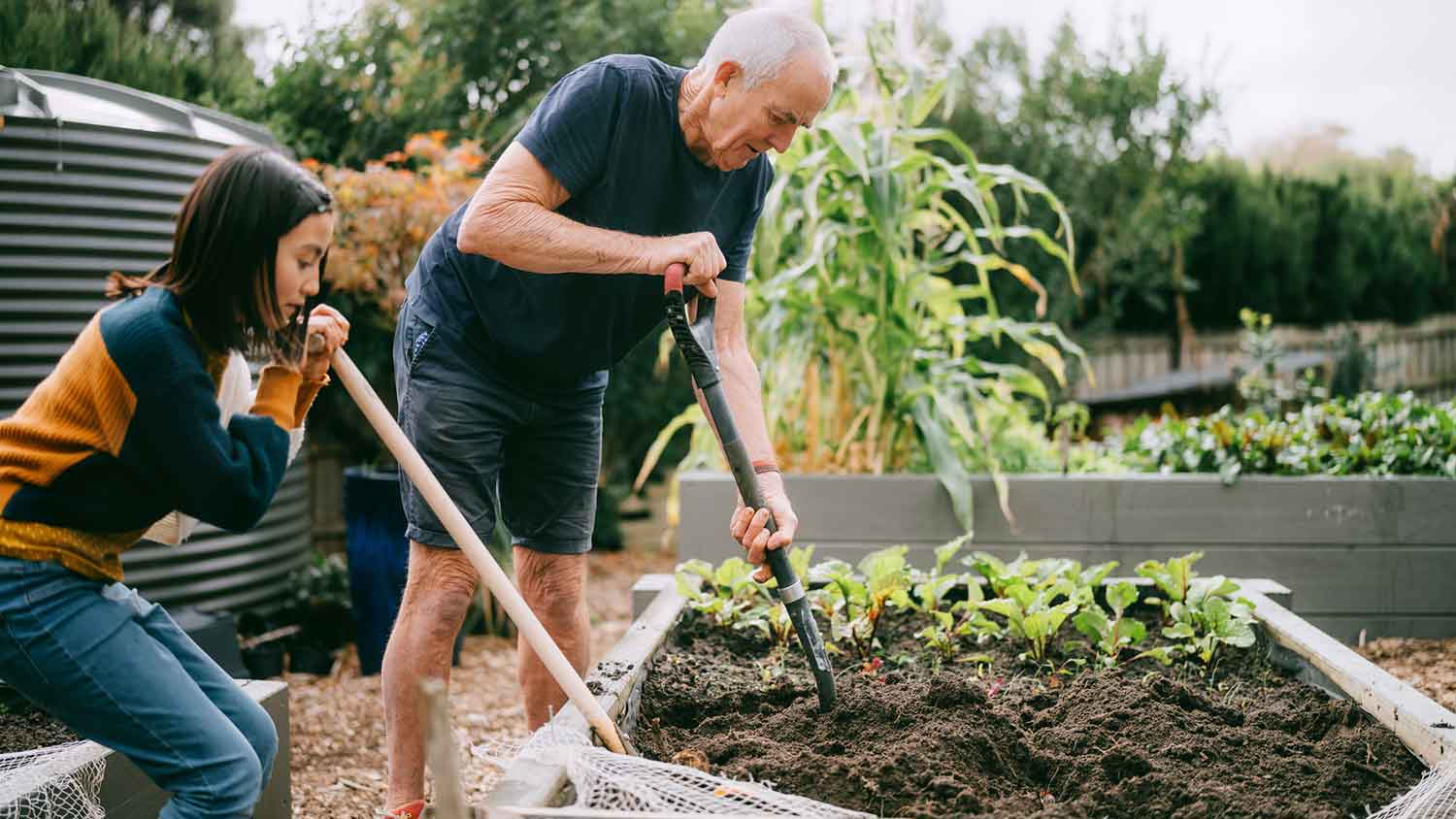
If you’re planning a garden and asking yourself, “How many yards of dirt do I need?” this dirt calculator will help you do the math to find the right number.